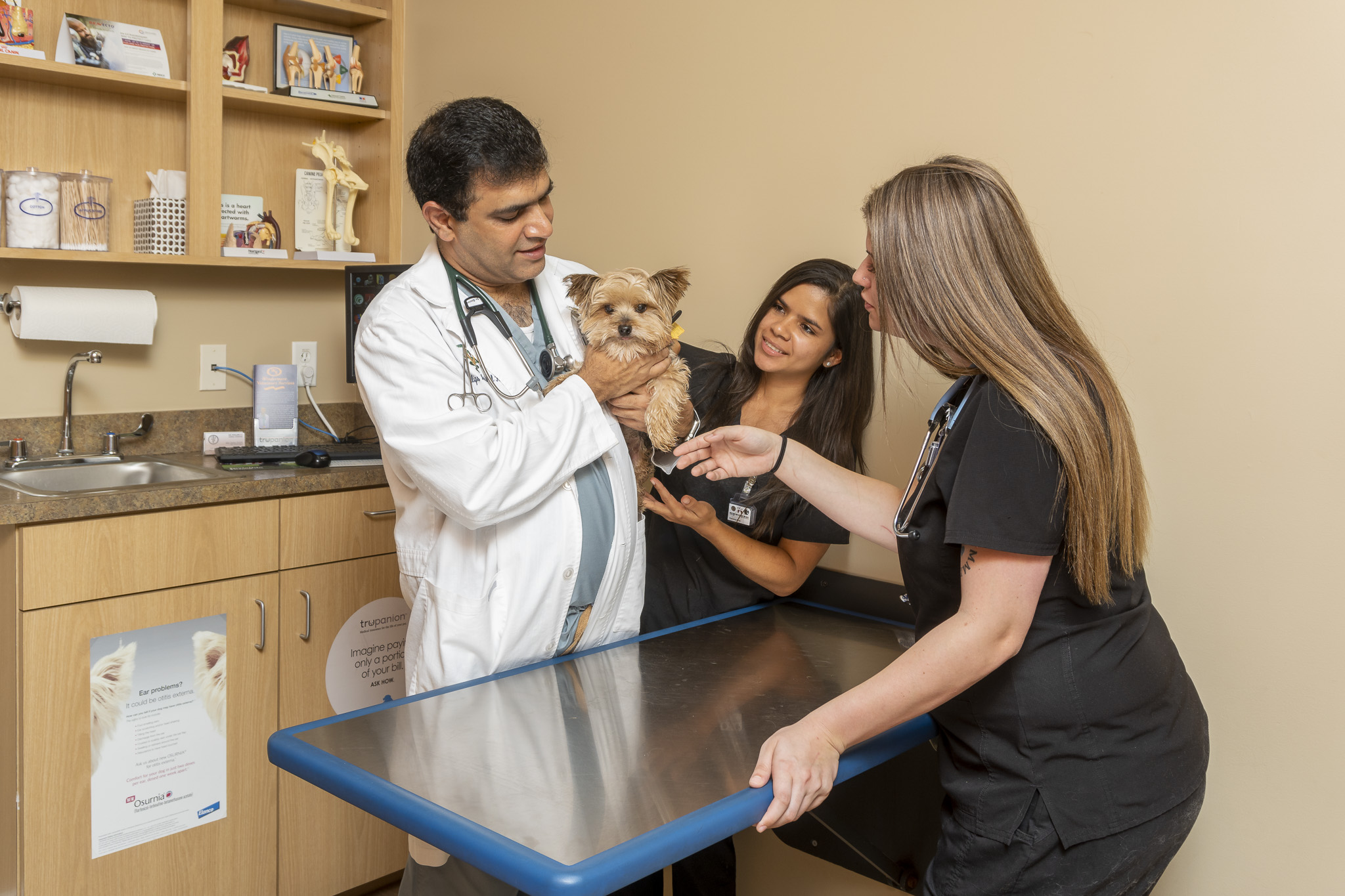
We're here for you
Emergency?
If your pet is exhibiting concerning symptoms or experiencing a medical emergency, please call our clinic at (407) 352-2579. We’ll help you through it.
Both dogs and cats spend a lot of their time sleeping. A dog can spend more than 50% of their day napping while a cat could spend 70% of their time asleep. This means that a lot of sleeping is perfectly normal for many pets. However, because it’s also a sign of a behavioral or health problem, it’s important to know when you should be concerned.
What Can Cause Abnormal Sleep in Pets?
While sleeping a lot can be normal, there are times when sleeping too much can be a problem. Typically, if a pet is suddenly sleeping more than they usually do or if they’re sleeping a lot more than the average, you should start paying attention to other symptoms your pet might have.
How much sleep is normal in a pet?
The average adult dog typically sleeps 12-14 hours a day. Adult cats generally sleep 12-16 hours per day.
Your Pet May Be Anxious
A pet that is anxious might sleep more than pets that aren’t. If anxiety is the culprit, then your pet may come across as lethargic. To combat this, work with your vet on treating your pet’s anxiety, which could be caused by a variety of things, from separation and loud noises to strange situations or illnesses. Your vet may prescribe calming medication or help you to train your pet better to ease the anxiety.
Your Pet May Have Hypothyroidism
Hypothyroidism, also known as thyroxine deficiency, can cause abnormal sleeping patterns in pets. It can occur in both cats and dogs and can result in lethargy, among other symptoms. Typically, if your pet has hypothyroidism, there will be other clues that something is wrong, such as weakness, losing fur, matting, weight gain, and more. Look for other symptoms of your pet being unwell and take them to a vet right away if you’re concerned.
Your Pet May Have Diabetes
Diabetes in dogs and cats is just like that in humans. The body isn’t producing insulin in the amount that the body requires, resulting in symptoms such as sleeping more, weight loss, increased urination, and excessive thirst.
Your Pet May Have a Bacterial Infection
Bacterial infections can be highly contagious between pets, so it’s important to know if this is a possibility for your pet. Other symptoms of a bacterial infection can include hair loss, itching, a rash, scabs, or crusting. Veterinary treatment is a must if your pet has a bacterial infection.
Your Pet May Have a Viral Infection
A viral infection, or virus, could also cause your pet to sleep more. If your pet is ill, then there will be other symptoms to indicate that they’re unwell, such as coughing, fever, runny nose, vomiting, and diarrhea. Viruses can be very dangerous, or even fatal, in pets, so if you see these symptoms, take your pet to the vet straight away.
What Are Common Pet Viruses?
The types of viruses that dogs and cats can get differ. In dogs, the following viruses are common and are typically vaccinated against:
- Parvovirus
- Kennel cough
- Distemper
In cats, some common viral infections include:
- Feline immunodeficiency virus
- Feline herpes
- Feline leukemia
- Feline distemper
- Feline calcivirus
How can I prevent a virus in my pet?
Make sure your pet is always up-to-date on vaccinations, which can help to protect against viral infections.
Your Pet May Be Anemic
Anemia in pets causes sleepiness and lethargy just like it does in humans. Anemia can be a sign that a parasite is sucking your pet’s blood, however. These parasites could be:
- Roundworms
- Hookworms
- Whipworms
- Tapeworms
Your Pet May Have Eaten Something Toxic
There’s a long list of foods and plants that are toxic to pets that they might eat, no matter how diligent the pet owner is. Lethargy is just one of several symptoms that your pet may have eaten something toxic. Other symptoms can include vomiting, diarrhea, pale gums, and more. If you notice your pet sleeping more along with other symptoms, take them to the vet immediately.
What Factors Impact Sleep Needs?
Sleeping a lot could be perfectly normal for your pet. There are a number of different factors that can influence just how much sleep your pet might need per day.
Your Pet’s Age
Just like humans, dogs and cats need different amounts of sleep at different times of their lives. For dogs, the puppy stage is one that requires a lot of sleep. They also sleep more as senior dogs. The same goes for cats: kittens and older cats sleep much more than adult cats do. The shift between life stages and the amount of sleep your pet needs at each one should be a gradual process, however, rather than a sudden shift.
Your Pet’s Breed
Larger dog breeds tend to sleep more than smaller dogs. They also tend to age more quickly than smaller breeds do, which means that they’ll reach a point where they’re considered a senior dog sooner than a smaller dog would.
Your Pet’s Level of Activity
A pet that has a lot to do will spend its time doing that, whether it’s play or a job like guarding. Pets with lower activity levels may spend their time sleeping instead. Keep your pet active to combat sleeping out of boredom.
The Weather
In some pets, usually cats, the weather can impact how much they sleep. For example, on a colder, rainy day, a cat may spend more time napping than on a warmer, sunnier day.

Step One:
Call us to book your pet’s appointment.

Step Two:
Our expert vet will take care of all of your pet’s needs.

Step Three:
Get back to enjoying your happy and healthy life with your furry best friend.

Get the Best Care for Your Pet
Come Visit Dr. Qasim
Book your pet’s appointment with Dr. Qasim to ensure a long, happy life together.

We love and care for each patient as if they were our own pet.
Meet Our Team of Animal Lovers
Dr. Bilal Qasim, DVM, established Dr. Phillips Animal Hospital in 2011 after practicing veterinary medicine for over 17 years with the help of talented and caring veterinary technicians.


We love and care for each patient as if they were our own pet.
Meet Our Team of Animal Lovers
Dr. Bilal Qasim, DVM, established Dr. Phillips Animal Hospital in 2011 after practicing veterinary medicine for over 17 years with the help of talented and caring veterinary technicians.


